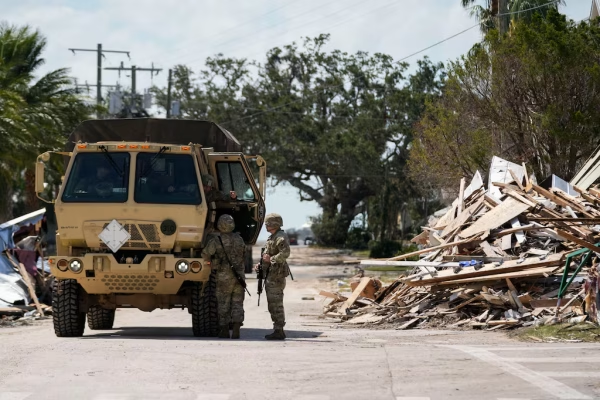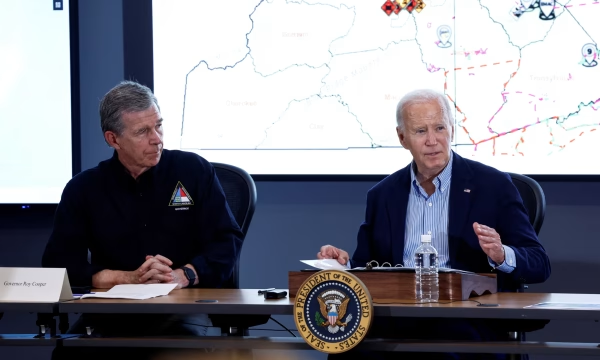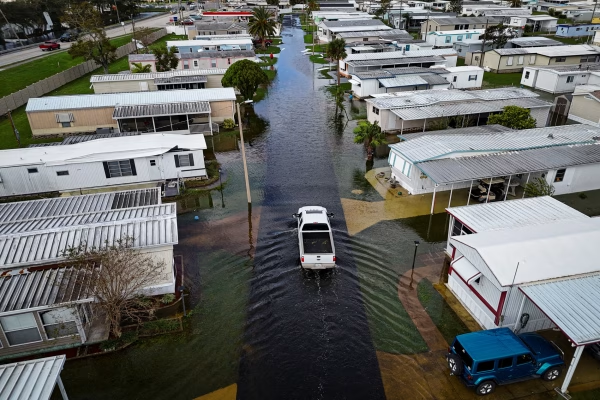Hurricane Helene, one of the most powerful storms of the season, left a path of widespread destruction and chaos along the Southeast of the U.S. in late September 2024. As residents across six states scrambled to recover, intense scrutiny and criticism arose regarding the government’s preparedness and effectiveness in responding to the disaster. This begs the question: were federal and state officials able to handle the hurricane, or did Helene expose gaps in the country’s ability to handle extreme weather?
Local governments were the first to respond to the disaster along with other organizations such as electric utility companies. The Federal Emergency Management Agency (F.E.M.A), the government agency responsible for providing relief after disasters, immediately deployed personnel to affected areas. More than 500 F.E.M.A were sent just to North Carolina alone, assisting local and state forces in securing safety for those affected. Additionally, 1,000 soldiers were authorized by the Pentagon to assist in relief efforts.

“When reading about the government efforts for relief I thought they were sufficient,” said sophomore Shira Crispin.
Despite these efforts, many critics still argue that the government’s response was insufficient. Misinformation quickly spread across social media worsening the situation. Posts suggested that thousands of soldiers were waiting around instead of being deployed to help, and some blamed North Carolina governor, Roy Cooper. Additionally, false information has spread saying that affected individuals would only receive $750 in compensation for their losses, or that F.E.M.A funding things like undocumented immigrants.
“When I heard the news that people in North Carolina were struggling without government help I wasn’t surprised,” sophomore Talia Kahen said. “I feel like the government never does what they are supposed to.”
President Joe Biden attempted to reassure Americans of the government’s capability to handle this disaster by issuing a video. This video follows a trip he made to affected states in order to see damages firsthand. He reassures residents that they will receive aid monetarily and through federal troops.
In a separate statement, Biden blames his predecessor, Donald Trump, for the spread of “onslaught lies” regarding the federal government’s response to Helene.
“Quite frankly, these lies are un-American,” President Biden said. “Former President Trump has led this onslaught of lies.”

While some support Biden’s actions others, such as Republican Representative Marjorie Taylor Greene have condemned the president on the basis of assigning blame for America’s problems rather than solving them.
Other critics blame the Republican Party for the government’s poor response to Helene, due to the 100 republican congresspeople who voted against $20 billion for the FEMA disaster fund, which was still passed.
Additionally, the long-term recovery process has come under scrutiny. While the immediate response was more coordinated, critics argue the country is unprepared for future storms, such as Hurricane Milton. Due to hurricane Milton, another hurricane that made landfall as a category three in Florida, many are worried about the government’s ability to handle the relief needed from both hurricanes.
“Watching the government’s response to Helene made me very nervous as someone with a lot of family in Florida who will be affected by Milton,” said sophomore Abby Podwall.

The aftermath of both hurricanes left millions without power and water at their peaks, and now weeks later thousands still lack electricity. This prolonged outage has caused growing frustration, particularly in rural areas where infrastructure repairs are slower. Residents have raised concerns about the sufficiency of the government’s long-term plans, worrying how future storms might worsen these issues. Utility companies are also overwhelmed by the demand for repairs highlighting the need for better disaster preparedness and more efficient recovery protocols to prevent similar delays in the future.
Overall, the ongoing issues and recovery efforts raise ongoing concern about whether the government is truly equipped to handle future disasters of this scale.







